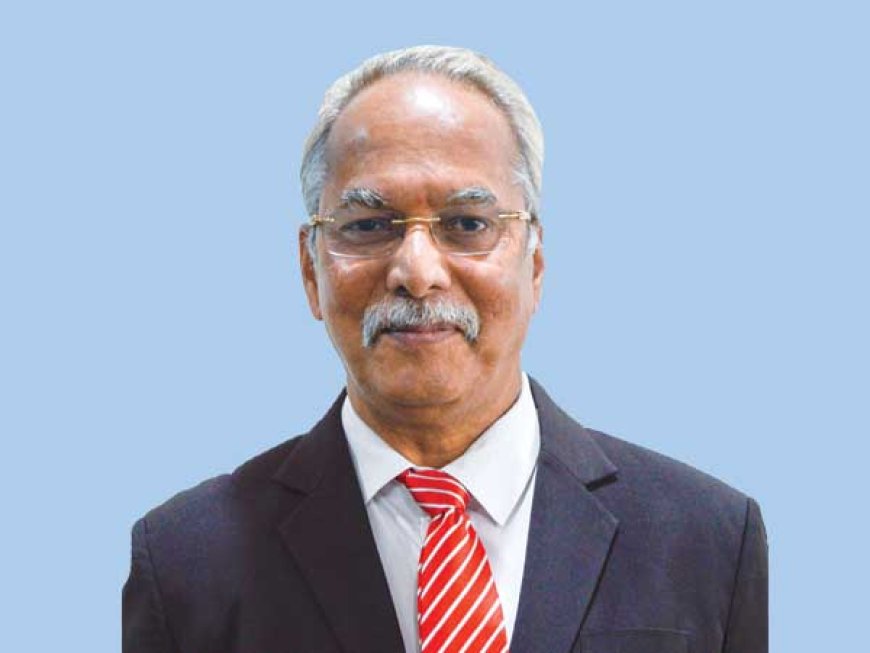At Ammann, we place a strong emphasis on sustainability practices, striving to integrate them into every facet of our operations.
Anand Sundaresan, Managing Director, AMMANN India What was your focus at Gujarat Conex? For many years, Gujarat contractors have earned a reputation as experts in road construction. Therefore, it is crucial for those in the road machinery industry to establish

What was your focus at Gujarat Conex?
For many years, Gujarat contractors have earned a reputation as experts in road construction. Therefore, it is crucial for those in the road machinery industry to establish a presence in Gujarat. Our primary focus is on the manufacturing of road machinery, making Gujarat a vital market for us. Notably, Gujarat’s road contractors are also actively involved in road projects in Rajasthan, indicating a strong connection between the two states. Furthermore, many Gujarat-based contractors undertake significant National Highway projects. Given these factors, Gujarat holds immense significance as a market for us. Our participation in this exhibition is equally important, as we are a Gujarat-based company, and it is essential to showcase our presence.
How do you look at the Gujarat as well as western India market?
In the context of the western region, it’s essential to distinguish between Maharashtra and Mumbai, and the other parts of the region. Additionally, Goa, if considered part of the western region, should also be separated for analysis.
In Gujarat, contractors have a long-standing tradition of innovation, predominantly operating as proprietary concerns. Unlike many other regions, there’s a lack of corporate entities in Gujarat. However, over time, they’ve made significant advancements. More and more individuals involved in national highway projects are embracing modern equipment and practices.
The presence of a company like Ammann in Gujarat has played a pivotal role in attracting professionals to the region. Some years ago, we experienced a loss of customers due to the enterprising nature of Gujaratis. Many local manufacturers competed with us, making it challenging to maintain our market share. However, we’re now regaining these customers as everyone in the industry is upgrading their technology and practices.
You said upgrading of technology. We are seeing lot of sustainability practices implemented by Ammann. Can you tell us how do you practice it?
At Ammann, we place a strong emphasis on sustainability practices, striving to integrate them into every facet of our operations. Our commitment to environmental, social, and governance (ESG) principles is central to our corporate vision.
Within our manufacturing facilities and across our equipment portfolio, we are dedicated to embracing green and sustainable initiatives, with a primary focus on reducing our carbon footprint. Whenever we establish a new factory, we ensure that it adheres to the highest sustainability standards. In our existing facilities, we are actively transitioning to non-conventional sources of energy to minimize our environmental impact.
In India, we are actively exploring the installation of additional solar panels in our plants to reduce our reliance on conventional energy sources. In our equipment design and development, we consistently work towards reducing carbon emissions. For instance, in our asphalt batching plants, we have made significant advancements in burner technology to facilitate the use of cleaner, more sustainable fuels. We have transitioned from LDO to gas burners, and we are actively researching the integration of electrically heated bitumen tanks, as well as exploring the possibility of using ethanol, methanol, and even green hydrogen as a fuel in certain applications.
Our presence as a direct subsidiary of a multinational Swiss company provides us with a unique advantage. We have access to cutting-edge research and technology, allowing us to incorporate the latest innovations into our operations. This underscores our unwavering commitment to sustainability and our mission to lead the way in responsible and environmentally conscious practices within our industry.
What are your plans and vision for Ammann as a group?
When examining asphalt plant manufacturers, we proudly stand as the largest player in the industry with a remarkable legacy of 150 years. Our steadfast commitment is to preserve and build upon this legacy, envisioning growth through both organic and inorganic means. Our primary sphere of expertise revolves around road machinery, where we aim to retain and expand our leadership.
The story resonates similarly in India. Here, we are dedicated to upholding our leadership position and nurturing it for the long haul. Our ambitious goals include doubling our efforts, augmenting our export capabilities, and bolstering production for the conglomerate’s Indian subsidiary.
With election’s scheduled next year, how do you think the market is going to respond?
Until the official election date is announced, which could extend through January or February, numerous contracts are poised to be awarded. These contracts will likely spur a wave of infrastructure initiatives, from which we stand to gain. To be candid, the impact of the election may only be significant if a change in government occurs. However, if the current administration continues, the difference may be relatively minor.
Tell us about your overall review about this exhibition.
I would like to highlight a few aspects of our participation in this exhibition. On the asphalt plant front, we are showcasing our range of equipment. While the limited space on the stage prevented us from displaying the full-scale of Apollo brand (of which we are the original owners) products, we have presented a model however. Additionally, we are showcasing our advanced asphalt batch plants, which are environmentally friendly to meet government demands for recycled asphalt usage. We have cutting-edge technology that allows for up to 60% recycled asphalt use, and within our company, we possess the capability to use up to 100% recycled materials. This technology has already been implemented in over 50-60 installations across Europe, and although it may take some time to introduce in India, it represents a significant development.
Furthermore, we have unveiled our mechanical paver and tracked pavers, including 7-meter track pavers, which were temporarily halted for the conversion from BS3 to BS4 but are now fully launched and featured in this exhibition.
Hits: 10








